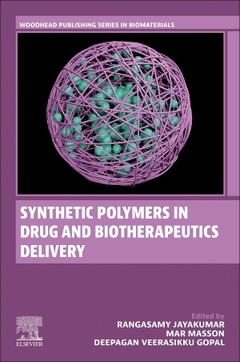Synthetic Polymers in Drug and Biotherapeutics Delivery Woodhead Publishing Series in Biomaterials Series
Coordonnateurs : Jayakumar Rangasamy, Masson Mar, Gopal Deepagan Veerasikku

Synthetic Polymers in Drug and Biotherapeutics Delivery covers recent advances in the design, synthesis and application of engineered polymers in the delivery of drugs and other biotherapeutic agents. The book covers new polymers that are fast replacing obsolete polymers in the field of drug delivery. Each chapter focuses on a specific polymer, detailing its design, synthesis, fabrication techniques and applications in drug and biotherapeutics delivery. This thorough examination provides a review of the latest research in this rapidly-changing field. Hence, it will be of interest to materials scientists, pharmaceutical scientists, biomedical engineers, chemical engineers and clinicians with an interest in materials development. Synthetic polymers provide a unique set of opportunities in drug and bio-therapeutic delivery due to their chemical versatility and tunable physicochemical properties. Such polymers can be formulated into nanoparticles, nanofibers, nanogels, microparticles, beads, hydrogels, and scaffolds to suit specific needs such as drug release rate and biodegradation with low toxicity.
1. Role and challenges of synthetic biopolymers in drug/bio-therapeutics delivery 2. Poly (caprolactone) 3. Poly (d,l lactide-co-glycolide) 4. Poly (amidoamines) 5. Poly (vinyl alcohol) 6. Poly (oxozolines) 7. Poly (amides) 8. Poly (ethylenimine) 9. Poly (ethylene oxide) 10. Poly (N-isopropyl acrylamide) 11. Poly (2- hydroxyethyl methacrylate) 12. Poly (N-(2-hydroxypropyl methacrylamide) 13. Poly (dioxanone) 14. Poly (phosphazenes) 15. Blending techniques and formulation strategies 16. Clinical application, regulatory status, and future perspective of synthetic biopolymers in drug/bio-therapeutics delivery
Prof. Jayakumar Rangasamy's research laboratory is mainly interested in the development of biopolymeric nanofibers, nanogels, nanoparticles, nanocomposite scaffolds and injectable hydrogels for Drug Delivery, Hemostasis, Infectious Diseases, Tissue Engineering, Regenerative Medicine and Wound Healing applications. He received his Ph.D. in Polymer Chemistry from Anna University, Chennai, India (2002). He was awarded the University Postdoctoral Fellowship from Chonbuk National University (2002-2003), South Korea. In Portugal, he was awarded FCT Postdoctoral Fellowship from the Government of Portugal (2003-2005). In addition, he was also awarded the prestigious JSPS Postdoctoral Fellowship (2005-2007) from the Japan Society for the Promotion of Science (JSPS), Japan. He has published 265 articles in SCI Journals, edited 7 books, 12 book chapters and 12 patents to his credit. He is also reviewer and editorial board member of many international journals. His publications have been cited more than 23000 times with h-index-80. He has received the “Best Paper Award from Journal of Materials Science Materials in Medicine (Springer) and IET Nanobiotechnology Journal. He received “Faculty Researcher Award-2016 from Indian Chitin and Chitosan Society and “MRSI Medal-2017 from Materials Research Society of India (MRSI). He also received “India Research Excellence-Citation Awards 2017 (Health & Medical Science area) from Clarivate Analytics, Web of Science. He was selected as a “World Top 2% Scientists from India in “Polymers field by Stanford University, USA in the year of 2020 & 2021. He recently received “Chancellor’s Research Excellence Award-2021 from Amrita Vishwa Vidyapeetham (University), India. He has also been listed in the “Top 10 Material Science Researchers from India.
Prof. Mar Masson, Ph.D.
- Details the immunological aspects of synthetic polymeric materials, helping the reader prepare for, and even avoid, unwanted side effects of use
- Reviews each polymer sub-type, chapter-by-chapter, ensuring thorough coverage and detailed analysis of each
- Explores a range of applications in drug and biotherapeutics delivery, including treatments for cardiovascular, neurological and gastrointestinal diseases
Date de parution : 10-2024
Ouvrage de 450 p.
15.2x22.8 cm



